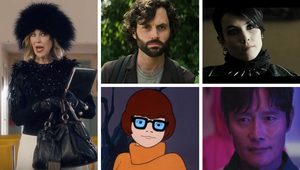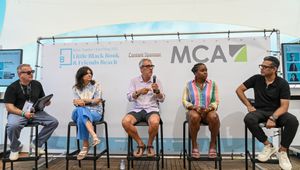
“I Cannot Be Detached From the Work": Rafael Rizuto on Leading Ogilvy North America

Rafael with Ogilvy's global CCO, Liz Taylor
---
“Third time’s a charm, right?” Rafael Rizuto is pondering his third Ogilvy stint, which kicked off in August of last year as the WPP network’s North America chief creative officer. When he first left his native Brazil back in 2007 - “oh my gosh, I’m ageing myself here,” he quips - it was to join Ogilvy Dubai, and a short while after his return he joined Ogilvy Brazil, when Anselmo Ramos was at the helm, in 2011. After that he joined Pereira O'Dell as a creative director, 180 LA as an executive creative director, launched his own agency, and was chief creative officer at BBH USA and Dentsu Creative US and Hispanic LATAM.
“It’s been amazing,” says Rafael. “I think the agency is probably pushing more for creativity now. You feel it in all corners, in every effort to have an idea.”
Rafael joined Ogilvy at a good time. The agency was named Network of the Year at Cannes Lions 2024, while Ogilvy New York had its strongest Cannes performance ever and ranked in the top three agencies in the entire world. Parent company WPP was named Creative Company of the Year, while The Coca-Cola Company was named Brand of the Year, which Ogilvy played a significant role in. At the London International Awards, Ogilvy was, again, Network of the Year, Ogilvy North America was Regional Agency of the Year, and Ogilvy New York was Global Agency of the Year. More recently, Ogilvy New York picked up one of only four coveted 2024 Immortal Awards for Coca-Cola 'Recycle Me'.
“I joked with Liz [Taylor] and the team, ‘Why did you guys bring me?',” he says when I suggest the difficulty of coming in to lead a well-oiled machine versus being able to make your mark via an explicit ‘fixing’ process, something which Rafael admits has been a more common theme of his career.
“It feels like my role is more about continuing the momentum,” he adds. “Our industry is great at throwing fireworks, but not as good at building lighthouses. That’s what excites me about Ogilvy. There’s often a lot of one-off successes, but what I see here is different. The most recent famous work—like campaigns for L’Oréal, Dove, Coca-Cola, and Verizon—has been iconic. It’s not just about small projects; we’re creating lasting work for our biggest brands. We’re building lighthouses, not just lighting fireworks.”
It’s still early days in Rafael’s tenure at Ogilvy North America, but he’s already particularly proud of the team that’s being assembled around him - “kindred spirits, creative minds with incredible careers, not just in creativity but also in social and strategy.” He sees Ogilvy as a “magnet for great talent” right now, which in turn creates the healthiest of virtuous cycles. “The more talented people you bring in, the better the work becomes, and so on,” says Rafael.
And after all, in the business of creativity, it’s all about the people. “As Sir John Hegarty said, some people in our industry go to bed praying that what we do will someday become a science. It never will. It’s always about the people,” says Rafael, who quotes his advertising idol multiple times during the interview.
“In some places, people think capability is more important,” he adds. “But no, I think it’s the people. Capabilities can be commoditised; everyone is on a level playing field. It’s the people who make the difference. I go a long way in taking care of the people, and when you take care of the people, the work takes care of itself.” Work for Dove and Verizon (a collaboration with Barbie) are two creative highlights for Rafael so far during this third Ogilvy stint.


Another philosophy which Rafael leans on comes from Buddhism, but, he feels, is very relevant to the advertising industry. “Pain is inevitable,” he says. “But suffering is optional. There is pain sometimes—burnout, long hours—but there’s also a lot of unnecessary suffering that we can eliminate. I feel that a big part of my job is removing that suffering, letting people have fun.”
Rafael points to Ogilvy’s ‘Hot House’ format that it uses for global projects and briefs. It’s a one-week process: teams are briefed on a Monday, have daily reviews with the client throughout the week, and on Friday they present the final work. The intense focus of the process means that the client is fully committed and ready to buy the work at the end. And for the creative teams it totally changes the dynamic—they’re fully dedicated to the issue or project at hand.
“Our global CEO, Devika [Bulchandani], often says something that might sound controversial these days,” says Rafael. “We are going back to basics. We are an idea company—that’s what we sell. Creativity.
“It’s very refreshing. Right now, we’re in the midst of talking about the bright, shiny thing of the day. Is it AI? Yeah, it’s part of our lives now, and we need to embrace it.
“But another thing John Hegarty says that I love is, "Practices change, principles never change." The principles are always there. We’re an idea company. How we go about creating ideas, how we craft them—that can change, and we should embrace that change. But the principles remain very strong here at Ogilvy.”
Something else that never changes is Rafael Rizuto’s love and zest for his craft. As an art director, much like his beloved Sir John Hegarty and somewhat a rarity in agency creative leadership, he feels that we now live in a world where everything is more visual and ephemeral than ever before. As such, it’s Rafael’s belief that having a more aesthetic and visual way of seeing the world as a creative leader is more important than times past.
“I honestly feel that I’m at a stage in my career— and I say this with no arrogance—where I’ve done so much. I’ve won my fair share of awards. What I love most now is providing an environment where people can do their best work. To this day, what I love most about our industry is the work itself.
“Even during my interview with Dev and Liz, I told them, ‘I cannot be detached from the work. I am a practitioner. I don’t know how to just be a manager—I need to be in it.’”















